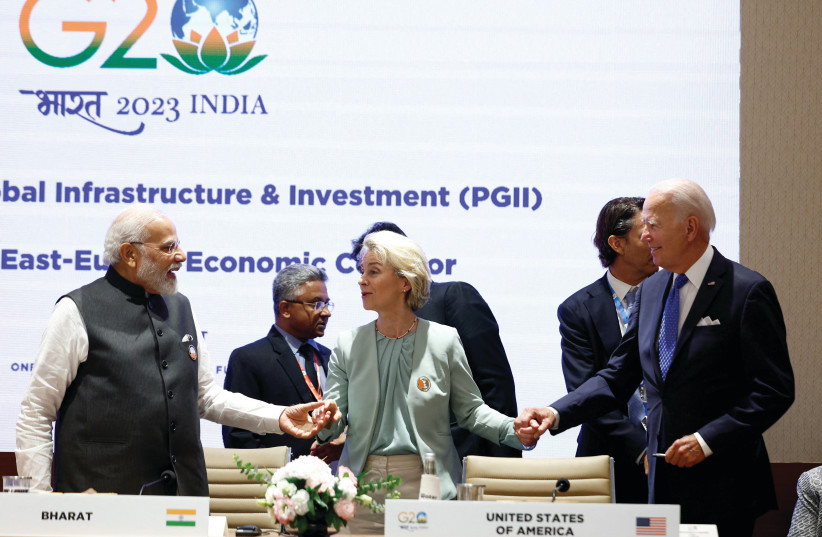The G20 summit unveiled a potentially game-changing economic corridor that envisions knitting together India, Saudi Arabia, and Europe. It would involve key hubs in the UAE, Israel, Greece, and other countries, and it has also gained the support of the US and EU.
The corridor has a lot of potential and links up with other initiatives, such as the Negev Forum and the I2U2 group of Israel, India, the UAE, and the US.
This seems like great news, with ships sailing in the right direction and dovetailing with visions for the Abraham Accords, just ahead of their third anniversary. It is a blueprint for the next stage of normalization. Yet critics point out that much work still needs to be done.
Some have wondered how this corridor is cheaper than using existing networks, such as the Suez Canal. Others wonder if it will actually receive the investment it needs to get off the ground. Some countries likely want to shift the corridor. Turkey and Qatar, for instance, will be nonplussed.
This means there are some elephants in the room, one of which is China, which the US wants to shift global trade away from.

This stands contrary to the wishes of the Gulf states, which have been hosting large Chinese delegations and aiming for an independent policy, something that India wants as well. India is not as sour on Russia as the West, nor is Brazil, which will be the next host of the G20. India does have issues with China, but it is a strategic partner with Israel. Saudi Arabia, meanwhile, has reconciled with Iran.
All this means is that nothing about the new corridor is simple, but as an alternative to China’s Belt and Road, it might plug into them in some areas. While some European countries, such as Italy, are moving away from China’s Belt and Road, not everyone is concerned about it. In other areas, it is clearly a potential rival both to Belt and Road and to Iran’s North-South economic corridor, as well as to the corridor that goes via Turkey to Central Asia.
That doesn’t mean that multiple routes can’t work at the same time. It does mean, though, that there will be countries looking askance at this new initiative.
Regarding Israel and the Abraham Accords
From the Israeli perspective, there are a number of outstanding issues. Israel, Greece, and Cyprus are working closely together, while I2U2 already includes key elements of the new corridor, as does the Negev Forum. So, pieces of the corridor already exist, with the UAE already being a huge shipment hub.
“Saudi Arabia’s Crown Prince Mohammed bin Salman on Saturday announced the signing of a memorandum of understanding between India, the Middle East, and Europe for the construction of a new economic corridor,” Riyadh-based newspaper Arab News reported, citing the Kingdom’s state TV.
MBS signed a “memorandum of understanding with the US, India, United Arab Emirates, France, Germany, Italy, and the European Union to establish the new economic corridor linking India, the Middle East, and Europe,” the report said.
There is a timetable that makes this perhaps more relevant than the East-Med pipeline idea, which so far has not gotten off the ground. The timetable is calling for working groups to meet in 60 days. For Israel to play a key role, however, it needs a seat at the table. Israel was not at the G20, nor is it in BRICS, the SCO, or other relevant groups.
The US backs this plan, as does the EU, which would also like to see a trans-African corridor that would go through the Angolan port of Lobito through to Zambia. That would be good news, and considering the current instability in the Sahel, it could improve Central and Southern Africa.
